新编实用英语基础教程Unit 4 What Do You Do Every Day
《新编实用英语》Unit 4 Session 1
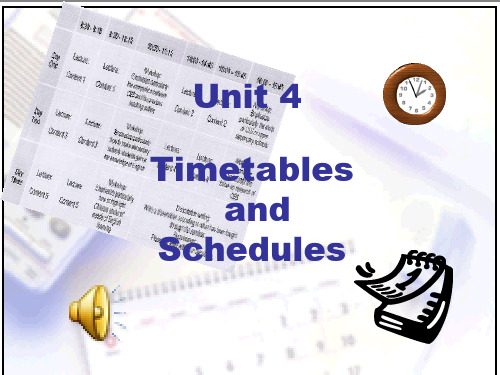
New Practical English I
Sample dialogues
1. Do you know how to make and keep an appointment?
Warm-up
Unit 4
New Practical English I
Speak out — making & keeping appointments Would you like to
Unit 4
New Practical English I
Sample dialogues
Read and find out
useful sentences and expressions for asking about timetables and giving responses.
Unit 4
appointment?
Unit 4
New Practical English I
Speak out — making & keeping appointments
You can make it at 2:00 if it is convenien t for you.
Our manager is available from 1:30 to 3:00 p.m. every Monday.
Unit 4
New Practical English I
Practice the following sentences.
3. There is no direct flight to Chengdu here, so the passengers have to ________ to another flight in Beijing.
《新编实用英语I》第四单元教案

步骤Steps:
Give the students a few minutes to read through the printed materials for each listening item.
Listen to the material for the first time without referring to the book.
5.Appreciating Culture Tips.
训练方法:1.头脑风暴,全班同学自主发言
2.个人练习,教师反馈
3.小组活动,教师监督
4.小组合作,情景剧创作表演
思考或作业:针对制定时刻表和工作日程表的各项任务的注意事项进行复习性的思考,分组进行小型操练,要求能根据不同目的制定周或月工作日程表。
任务1:学习工作场所交流时习惯用语和常用句子。
Objective:Sslearn the useful sentences for workplace communication.
目标:学生掌握工作场所交流时习惯用语和常用句子。
步骤Steps:
《新编实用英语》教案第一册Unit4
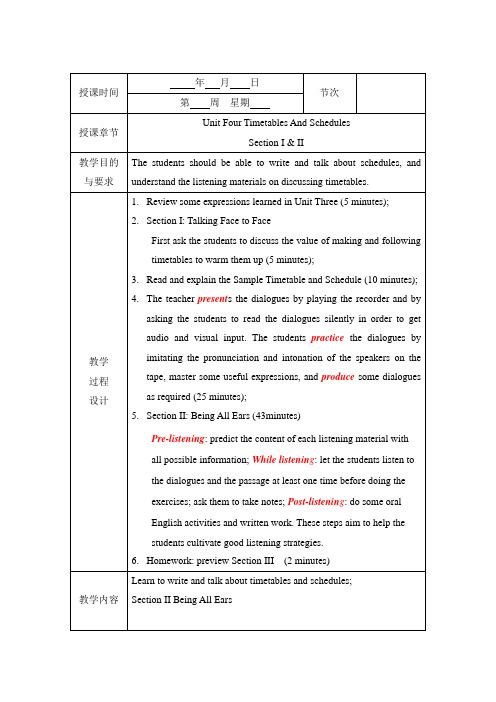
Unit 4 Timetables And SchedulesI. Objectives:By the end of this unit, the students should be able to1) read and discuss timetables and schedules in English,2) learn some expressions used in making timetables and schedules and write theirown timetables and schedules,3) comprehend the two passages and master the useful expressions in them, and4) finish the exercises by themselves or with some help.II. IntroductionLead-in(导入): First, the students are asked to discuss the topic—time. Then their opinions are written down on the blackboard. Finally, the introductory remarks will be made by the teacher as follows:It’s said that time is money. When money is used up, it can be back. However, when time is lost, we never get it back again. Time plays an important role in our life. In addition, time has cultural distinctions, so we should cherish time, and arrange our time properly. Then we need a timetable or schedule. Today we will study how to make timetables and schedules.III. Teaching Procedures:Section I. Talking Face to FaceStep 1. Presentation:Read the following two schedules and timetablesSample 1 Flight TimetableBeijing---Guangzhou---Hong KongNotes:1) a.m.: in the morning2) p.m.: in the afternoon3) Departure: going away4) Arrival: getting to some placeSample 2Mark’s ScheduleApril, 2002Notes:1) sales meeting: a meeting in which you can buy or sell goods just like trade fair.2) General Manager: a person who controls or manages the wholecompany.Step 2.Practice:Dialogue 1 Talking about a Flight TimetableBob is calling a receptionist for information about flights from Beijing to Hong Kong.Receptionist: CAAC information. Can I help you?Bob: Yes .Is there a flight to Hong Kong on Tuesday, the 16th?R: Yes, there is.Bob: Is that a direct flight?R: No you have to change in Guangzhou.Bob: Oh, how long does it stop over in Guangzhou?R: From 11 to 12.Bob: 11 to 12. That’s almost an hour. Well, I prefer a direct flight.R: I’m sorry, but there’s no direct flight on Tuesday.Bob: What about Wednesday, the 17th.R: There’s one on Wednesday, the 17th.Bob: Good. What’s the department time?R: 8:45 a.m. and the arrival time in Hong Kong is 11 in the morning. Notes:1) CAAC: Civil Aviation Administration of China (中国民航总局)2) Direct flight: the flight that can arrive at the destination directly. It’s also called “though flight”3) Change: get off from one flight then get on another oneQuestions:1) Which flight will Bob take?2) When will Bob arrive in Hong Kong by taking this flight?Dialogue 2 Talking about Mark’s ScheduleJoe: Have you been busy recently?Mark: Yes, and I have a busy schedule this week, too. This morning I need to write a business report and this afternoon at 1:30. I’ll discuss the report withthe general manager.Joe: What’s your schedule for tomorrow?Mark: Tomorrow is Tuesday .I’m attending the sales meeting au 8 inthe morning. And in the afternoon at 3 :00 I’m seeing Mr. Black, themarketing manager.Joe: What about Wednesday?Mark: I’ve got an appointment at 8:30 with Mr. Anderson, the bank manager .In the afternoon I’m taking the 4:45 flight to Hong Kong for the conference.Joe: The conference is on Thursday, right?Mark: Oh, yes, at 10:00 in the morning and 2:00 in the afternoon. After the conference, I’ll be free. I’ll be enjoying my weekend in Hong Kong.Joe: When are you coming back?Mark: I’ll take the 2:15 flight back on Friday afternoonQuestions:1) When is the appointment between Mark and Mr. Anderson?2) When will Mark go back?3) What does Mark do?Step 3. Production:Task: Imagine you are Mark. You are telling your friend Jack about your trip to Beijing. The following dialogue is provided for your reference.Jack: Hi, Mark. What’s your plan for this weekend?Mark: I’m going to Beijing.Jack: Oh, how interesting!Mark: I have some friends there and I miss them very much.Jack: I guess your friends will arrange your trip there.Mark: Yes. On Saturday one of my friends will drive me around the city. We’ll have lunch with some friends at noon. In the evening, we’ll go to a concert.Jack: Wonderful! When are you coming back?Mark: On Sunday evening. I am taking an evening flight back.Jack: I hope you have a nice weekend.Section II : Being All Ears(参考电子课件)Dialogue 1:Teaching Procedure (It aims to train the students with proper listening strategies.) Pre-listening: provide the students with the new words and expressions; read through the questions and the chart in exercise 1 and 2, and make somepredictions as to the content of the dialogue.While-listening: ask the students to listen to the dialogue for the first time and ask them just to understand the main idea of the dialogue not to finish theexercises; listen to the dialogue again and ask them to finish exercise 1;ask the students to repeat the dialogue sentence by sentence after the tapewhile the teacher will press the button “pause” on the tape recorder; listento the dialogue as a whole for the last time.Post-listening: ask the students to finish exercise 2, i.e. answering questions. This step aims to change listening to speaking.Notes: The following dialogue and the passage listening can be done in a more or less similar procedure.Section III: Maintaining a Sharp EyePassage 1 Punctuality and Keeping PromiseStep 1.Lead-in (In this step, some related information will be provided for the students.)PunctualityPunctuality is important in social activities because nobody likes to be kept waiting. A punctual person is usually considered reliable and responsible. Lack of punctuality implies that the person does not have consideration for other people’s time.Make an AppointmentMany people schedule their time carefully so it’s polite to make an appointment first if you need to see anybo dy. It’s usually necessary to make a phone call well in advance to make an appointment with a doctor, dentist, lawyer, manger etc. You’d better call off or postpone your appointment if you can’t make it. Try not to break an appointment without a notice in advance.Step prehension Questions (The students will be asked some compression questions after they have skimmed the passage to help them develop reading strategies.)(1)What is emphasized in social activities?(2) How will a foreigner feel if you are late in getting to the airport to meet him?(3) When should the guests come to a social activity?(4) If you are late for a social activity, what should you do?(5) What should you do if you cannot inform the person concerned of the change ofan appointment?Step 3. Explain the passage in detail(1) Explanations of Difficult Sentences①(Para. 1) --how anxious and embarrassed he will be when he, as a strangerto the place, sees no person meeting him!Analysis: This is an exclamatory sentence with when-clause as an adverbial of time. As means “being”, used here to introduce an adverbial of manner. Meeting is a present participial modifying “person”.Translation: 他来到一个陌生的地方,看到没有人来接他,他会是多么焦急和尴尬!Example: How happy and delighted she will be when she, as a foreigner, sees a friend meeting her at the airport.②(Para. 1) --The same is true with the activity of seeing off a foreign guest. Analysis: “The same is true with…”is a sentence pattern which means “…也是如此” in Chinese. “With” is a preposition introducing the kind of thing which has the specific feature(s) mentioned in the previous sentence(s).Translation: 给外国人送行也是如此。
新编实用英语unit4教案
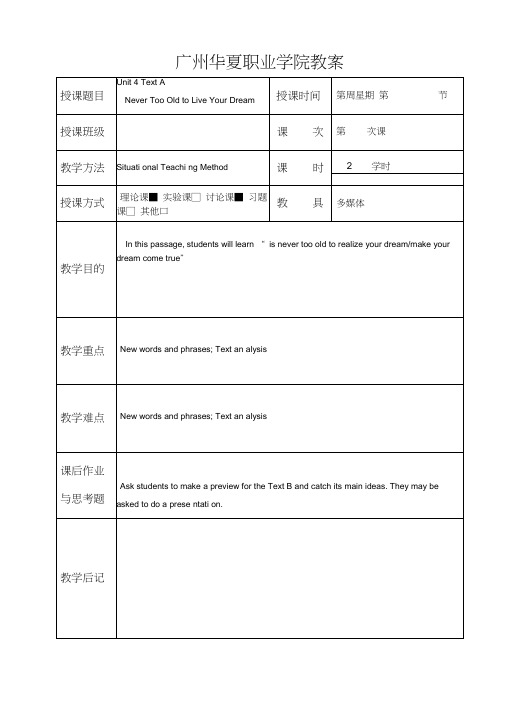
广州华夏职业学院教案广州华夏职业学院教案纸Never Too Old to Live Your DreamStep 1: lead-in part: One Minute Flywatch a short movie and take notes;discuss the following questions with your deskmates.1. What does “ succmeessan”for you? Are you eager for success?2. Do you thi nk “ ef努力;勤奋)is importa nt? Why? And give your reaso ns.and 3. Does “ effort “ will certainly lead to “ success ” ?(关tSre thbetwletions “ effortsuccessStep 2: lead-in part : Useful and Expression1.Beautiful/lovely day, isn 't it?2.It 's a nice/lovely/terrible day, isn 't it?3. Wonderful weather, isn 't it?4. What fine weather we 're having today!5. What 's the weather like/ the weather forecast/the temperature today?6.It ' s sunny/gfyo/gwarm and damp today.7.It looks like rain/a storm.8.We had a strong wind last night.9.It ' s going to clear up.10.I hope it ' ll clear up tomorrow.Step 3: New words and phrases 见PPTAsk students to look these words 'interpretation up in dictionary and catch their main idea. And then teacher lists their Chinese interpretations to check.Step 4: Text Analysis for Para1- 8Never Too Old to Live Your Dream--is never too old to realize your dream/make your dream come true.追求梦想,永远不会太晚Para 1:The first day of school our professor introduced himself and challenged us to get to know someone we didn 't know. I stood up to look around when a gentle hand touched my shoulder. I turned aruond to find a wrinkled, little old lady beaming up at me with a smile that lit up her entire being.Professor 教授,专家;in troduce on eself 介绍… 自己;challe nge 挑战;get to know 了解;look around 环视;gentle 温柔的,绅士的;turn around 回过头,转过身;wrinkled 有皱纹的;广州华夏职业学院教案纸beam at sb对着某人;lit up [light up]点燃;变快活;her entire being她整个人译文:开学的第一天教授做了自我介绍,他还要求我们去结识某位我们还不认识的人。
新编实用英语电子教案Unit 4
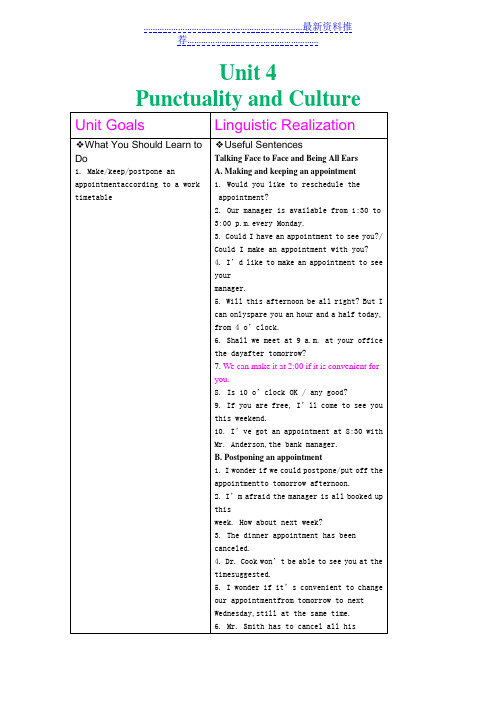
Unit 4Key and Translation SECTION ITalking Face to FaceThe topic area of Talking Face to Face in this unit is to make a timetable or a schedule. The focusof functions is on the patterns that are appropriate for making appointments and arranging activitiesin different situations.Imitating Mini-Talks1 Work in pairs. Look at the pictures and practice the following mini-talks about schedules and timetables.Acting out the Tasks2Work in pairs and act out the tasks by following the above mini-talks.2) Task: Look at the flight table in Exercise 3. Ask about the Tuesday flight for Hong Kong.A: Do you have flights for Hong Kong on Tuesday?B: Yes, we have one that leaves at 9:20 a.m. It is not a direct flight. You need to stop in Guangzhou, from 11:50 to 12:50 a.m.A: When does it arrive in Hong Kong?B: It arrives in Hong Kong at 1:55 p.m.3) Task: Look at Mark’s schedule in Exercise 3. Call to ask Mark for a change of an appointment.A: Mark, sorry I won’t be able to meet you at 3 Tuesday afternoon. Something unexpected has come up.B: Well, that’s all right.C: Is it possible to change the Tuesday appointment to Thursday? The same time?B: Sorry, I will be in Hong Kong Thursday. I will call you when I come back.4) Task: Look at Mark’s schedule in Exercise 3. Ask to make an appointment to see Mark on Wednesday.A: Hello, Mark. Do you have time Wednesday morning?B: I’m afraid not. I have an appointment with Mr. Anderson.A: What about Wednesday afternoon?B: Sorry, I have to catch the 4:45 flight to Macao.5) Task: Look at Mark’s schedule in Exercise 3. An old friend in Hong Kongasks to see Mark on Thursday.A: Hello, Mark. I’ve heard you’ve come to Hong Kong. Shall we meet on Thursday?B: Hello, Tom. I’m afraid I can’t make it Thursday. I have to attend a conference.A: Oh. Do you have time for going around Hong Kong?B: Yes. Let’s meet Friday morning and travel around the city.Studying Timetables and Schedules3Timetables and schedules are important in planning our activities. Now let’s read the following timetable and schedule.马克的时间表(2011年6月)Following Sample Dialogues4Read the following sample dialogues and try to perform your own tasks.Putting Language to Use56SECTION II Being All Ears Learning Sentences for Workplace Communication1 Listen to 10 sentences for workplace communication cross-referenced with their Chinese2Listen to the following sentences for workplace communication in Column A and match each3Listen to 6 sentences for workplace communication and choose their right responses.Handling a Dialogue4Listen to a dialogue and supply the information by filling in Susan’s schedule.key:March 11, Monday have a meetingMarch 12, Tuesday have dinner with friendsMarch 13, Wednesday an appointment with Mr. PetersonMarch 14, Thursday extra work in the officeMarch 15, Friday go to evening classesUnderstanding a Short Speech/Talk5Now listen to a short tour guide speech and fill up the blanks according to what you haveScript:Hello, everyone. I’m Lily, your tour guide. I’m sure you are excited about today’s tour. The first place we will be visiting isYongheTemple. Theone-hour temple tour finishes at about 11. Before having6Listen to the speech again and complete the information in Column A with the right choices inSECTION III Trying Your Hand Practicing Applied Writing1 Fill in the office hours by making use of the information in the passagethat follows.Writing Sentences and Reviewing Grammar3. He told us he (had) joined the Party in 2010.10. He lived in London until 2010.SECTION IV Maintaining a Sharp Eye Passage IPunctuality Pays!Information related to the reading passageAmericans and Europeans consider time to be an asset that can be spent and saved; therefore, proper scheduling of time and its appropriate allocation to various competing tasks is an important part of organizational management. Variations in time use are expected to influence performance and stress, as well as other outcomes. It is a vital strategic element. The large amount of management processes and methods developed to improve performance by managing time use proves the importance placed on time. Here are a few famous quotes and sayings about time and punctuality:Do y ou love life? Thus do not squander time, for that’s the stuff life is made of. —Benjamin FranklinTime wastes things away, and all things grow old through time. — AristotleTime takes all and gives all. — Giordano BrunoLost wealth may be replaced by industry, lost knowledge by study, lost health by temperance or medicine, but lost time is gone for ever. — Samuel SmilesFew things tend more to alienate friendship than a want of punctuality in our engagements. I have known the breach of a promise to dine or sup to break up more than one intimacy. — William Hazlitt Punctuality is the soul of business. — Thomas Chandler HaliburtonWhile we keep a man waiting, he reflects on our shortcomings. — AnonymousLanguage Points1Explanation of difficult sentences1. (Para. 1)Oneof the cultural differences that tend to annoy Americans has to do with understandingof punctuality.Analysis: Has to do with is a phrase meaning has a specified relationship with It is the predicate of the sentence.That introduces a restrictive relative clause modifying differences.Translation:有一种常会惹恼美国人的文化差异可能关系到对守时的不同理解。
新编实用英语教程Unit4
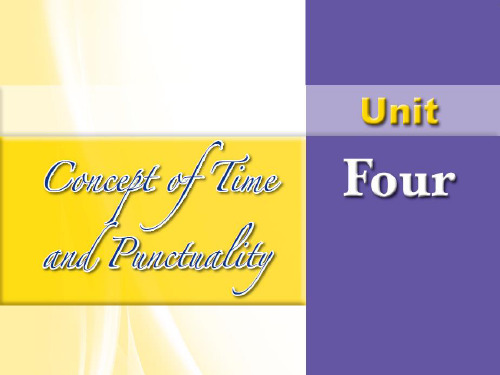
方便的
Unit | Four
3) Asking to Change the Appointment with Dr. Johnson A: I'd like to change the appointment with Dr. Johnson from Tuesday to Thursday. B: I'm afraid he won't be available on Thursday morning. A: What time would be convenient for him? Will 2 p.m. do? B: Yes, that'll be fine. 4) Asking About the Working Hours of a Ticket Office A: What are the office hours? 办公时间,营业时间 B: Well, the office office hours hours are from 9 a.m. to 6 p.m. A: Do you work on weekends? B: On Saturday the office is open from 9 a.m. to 3 p.m., but on Sunday we are closed. Macao 5) Asking About the Flights for Macao A: Do you have flights to Macao? B: We have only one flight to Macao each week, at 1:40 p.m. Wednesday. A: When does it arrive in Macao? B: At 3:40 p.m. 澳门
新编实用英语视听说基础教程第四版答案6

新编实用英语视听说基础教程第四版答案61、The car _______ after forty minutes driving, so he didn’t have the interview on time. [单选题] *A. broke down(正确答案)B. broke inC. broke outD. broke up2、41.—________ do you take?—Small, please. [单选题] *A.What size(正确答案)B.What colourC.How manyD.How much3、Modern plastics can()very high and very low temperatures. [单选题] *A. stand(正确答案)B. sustainC. carryD. support4、I don’t know how to improve my English. Can I ask you for some _______? [单选题] *A. answersB. advice(正确答案)C. questionsD. words5、一Mary wants to invite you to see the movie today. 一I would rather she(B)me tomorrow. [单选题] *A.tellsB. told (正确答案)C. would tellD. had told6、With all the work on hand, he _____ to the cinema last night. [单选题] *A.should goB.must have goneC.might goD..shouldn’t have gone(正确答案)7、Nearly two thousand years have passed _____ the Chinese first invented the compass. [单选题] *A. whenB. beforeC. since(正确答案)D. after8、If you don’t feel well, you’d better ask a ______ for help. [单选题] *A. policemanB. driverC. pilotD. doctor(正确答案)9、It’s raining heavily outside. Don’t leave _______ it stops. [单选题] *A. whileB. sinceC. until(正确答案)D. when10、I gave John a present but he gave me nothing_____. [单选题] *A.in advanceB.in vainC.in return(正确答案)D.in turn11、--Is that the correct spelling?--I don’t know. You can _______ in a dictionary [单选题] *A. look up itB. look it forC. look it up(正确答案)D. look for it12、93.Welcome ________ our school! [单选题] *A.to(正确答案)B.inC.atD./13、I was astonished when I heard that Louise was getting married. [单选题] *A. 惊讶(正确答案)B. 气愤C. 高兴D. 想念14、The manager gave one of the salesgirls an accusing look for her()attitude towards customers. [单选题] *A. impartialB. mildC. hostile(正确答案)D. opposing15、In fact, Beethoven did something brave than dying. [单选题] *A. 勇敢(正确答案)B. 冒险C. 可怕D. 奇妙16、______ visitors came to take photos of Hongyandong during the holiday. [单选题] *A. ThousandB. Thousand ofC. ThousandsD. Thousands of(正确答案)17、It’s windy outside. _______ your jacket, Bob. [单选题] *B. Put on(正确答案)C. Take offD. Wear18、The children were all looking forward to giving the old people a happy day. [单选题]*A. 寻找B. 期盼(正确答案)C. 看望D. 继续19、This kind of banana tastes very _______. [单选题] *A. nice(正确答案)B. wellC. nicelyD. better20、—Where did you get the book?—From my friend. I ______ it three days ago. ()[单选题] *A. lentB. borrowed(正确答案)D. returned21、The language school started a new()to help young learners with reading and writing. [单选题] *A. course(正确答案)B. designC. eventD. progress22、( ) --------Please take my seat here.-------- __________________________. [单选题]*A. That is nice of you(正确答案)B. I think it is my seatC. No, you sit hereD. I don’t think it’s a good seat.23、The sun disappeared behind the clouds. [单选题] *A. 出现B. 悬挂C. 盛开D. 消失(正确答案)24、65.There is a big sale on in the shop! Every-thing is ________ price. [单选题] * A.bigB.fullC.zeroD.half(正确答案)25、—Are these your sheep? [单选题] *A)on grass at the foot of the hill.(正确答案)B. feedC.is fedD. is feeding26、My father?is _______ flowers. [单选题] *A. busy watering(正确答案)B. busy waterC. busy with wateringD. busy with water27、____ is standing at the corner of the street. [单选题] *A. A policeB. The policeC. PoliceD. A policeman(正确答案)28、John is fond of playing _____ basketball and Jack is keen on playing _____ piano. [单选题] *A./…the(正确答案)B.the…/C./…/D.the…the29、It was()of you to get up early to catch the first bus so that you could avoid the traffic jam. [单选题] *A. senselessB. sensible(正确答案)C. sentimentalD. sensitive30、30.It is known that ipad is _________ for the old to use. [单选题] *A.enough easyB.easy enough (正确答案)C.enough easily D.easily enough。
unit 4 新编实用英语
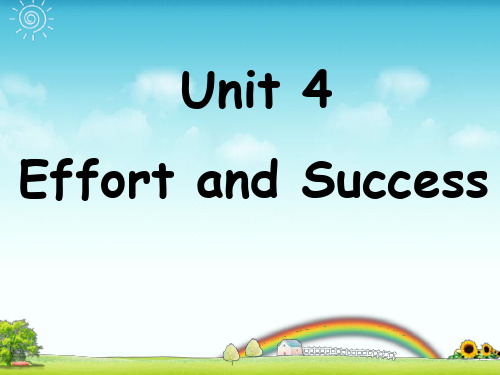
精彩片段赏析
Therefore, We learn from the movie that it is...
Never Too Old to Live Your Dream
Have a Try
分角色朗读课文
Detailed Study of Text A
While-Reading Task
innocent age?” I asked. rich husband, get married, have one or two
children, and then retire and travel.”
“你为什么在这么年轻而天真的年龄上大学?”我问。 她开玩笑地回答说:“我要在此遇到一个有钱的丈夫, 结婚,生几个孩子,然后退休,去旅游。”
就在我站起来四处张望时,一只手轻轻地搭 在了我的肩上。我转过身一看,一位满脸皱 纹个子矮小的老太太正冲着我微笑。这微笑 使她浑身光彩照人。
• 2 She said, “Hi, handsome. My name is Rose. I’m eighty-seven years old. Can I give you a hug?” • 3 I laughed and answered, “Of course you may!” and she gave me a big hug.
到学期末,我们请罗斯在我们的足球宴会上讲话。 正当她要开始已准备好的演讲时,她的5寸长3 寸宽的卡片掉在了地上。我们笑了起来,而她则 清了清嗓子,开始了演讲:
While-Reading Task
10 “We do not stop playing because we are old; we grow old because we stop playing. There are secrets to staying young, being happy and achieving success.” 11 You have to laugh and find humor each and every day. You’ve got to have a dream. When you lose your dreams, you die.
新编实用英语(第四版)视听说基础教程Welcome to Channel TV

Focal point
形容词性物主代词(Adjectival Possessive Pronoun)
2 NOW WATCH
Task 1 Watch the whole episode and check your answers to the questions in the previous exercise.
Task 2 a. Watch from the beginning of the episode to 00:50 and complete the card.
您是做什么工作的? 在英语口语中,该句型常用于询问别人的职业。类似的 表达还有: “What is your job? (你的工作是什么?)” 注意 第三人称的表达是:“What does your father do? (您父亲是做什么工作的?) ” 。 回答应该直接明了, 如:“He is a farmer.(他是农民。)” 。
Tracy Woodstock
Task 2 b. Watch the same piece again and write the receptionist’s questions.
1. Receptionist: _W__h_a_t_’_s_y_o_u_r_n__a_m_e_ ?
Tracy:
My……………..
screen n. 屏幕 spell v. 拼写
Words and expressions
be ready to do sth. 准备好做某事 last name (名字后面的)姓
新编实用英语(第四版)综合教程4电子教案Unit 4 The IT Age
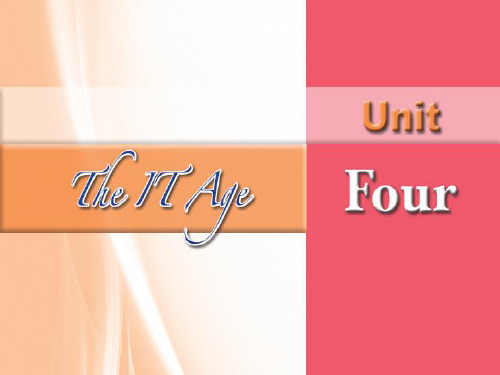
B: Yes, indeed. There are numerous information centers and data banks that 2 offer all kinds of information (提供各种各样的信息) .
A: 3 But there are always two sides to everything. (但事物都是一分为二的) . The Internet is no exception. We cannot neglect its bad effects.
Back
Unit | Four
2 Complete the conversation by translating the Chinese into English.
A: 1 The Internet is such a miraculous place (因特网是一个神奇的地方) that you can do anything you like there.
pronounce the sign in the e-mail address? Jack: You mean the letter “a” with a little tail? We pronounce
it as “at”. Mary: I see. Thanks. What else do you do when you are
A: I think 5 parental guidance is particularly important for children (对孩子们来
说父母的指导尤其重要) .
Back
Unit | Four
2 Complete the conversation by translating the Chinese into English.
Unit 4 新编实用英语第一册

人。 • attend:出席;参加
• I will attend the meeting tomorrow.
Textห้องสมุดไป่ตู้B Young Mozart
• 沃尔夫冈· 阿玛多伊斯· 莫扎特 • (Wolfgang Amadeus Mozart )
• 莫扎特:1756年1月27日-1791年12月5日,欧洲最 伟大的古典主义音乐作曲家之一 . • 1756年1月27日生于奥地利的萨尔茨堡一位宫廷乐 师的家庭,祖籍是德国,父亲是那座城中宫廷天主 教乐团的小提琴手。莫扎特有很多兄弟姐妹,他是 家中的第7个孩子,1791年12月5日猝死于维也纳, 终年35岁。其中最出名的歌剧是:《费加罗的婚 礼》、《唐璜》和《魔笛》。 • 莫扎特在幼年时被誉为“音乐神童”,作为古典主 义音乐的典范,他对欧洲音乐的发展起了巨大的作 用。莫扎特毕生创作了754部作品,其中包括22部 歌剧、41部交响乐、42部协奏曲、一部安魂曲以及 奏鸣曲、室内乐、宗教音乐和歌曲等作品。
于欢乐之中。
• • • • • •
dress up: v. 装扮;打扮 You do not need to dress up for dinner.
你们不必特意盛装赴宴。 revel: v. 陶醉;着迷 We revel in the church hymns. 我们非常陶醉于教堂的赞美诗。
• bestow upon: 把...给予 • bestow: v. 赠与;授予 (+on/upon)
•
歌剧是莫扎特创作的主流,他与格鲁克 (Gluck)、瓦格纳(Wagner)和威尔第(Verdi)一 样,是欧洲歌剧史上四大巨子之一。他又与海顿、 贝多芬一起为欧洲交响乐写下了光辉的一页。另 外,他的《安魂曲》也成为宗教音乐中难能可贵 的一部杰作。 • 作为18世纪末时的欧洲作曲家,莫扎特的音乐 深刻地反映了这个时代的精神,尤其是体现在歌 剧作品中的市民阶层的思想,无疑在当时具有进 步的意义。莫扎特赋予音乐以歌唱优美欢乐性, 然而,其中又包含着悲伤,这正反映了莫扎特时 代知识分子的命运。
《新编实用英语》Unit 4 Session 3
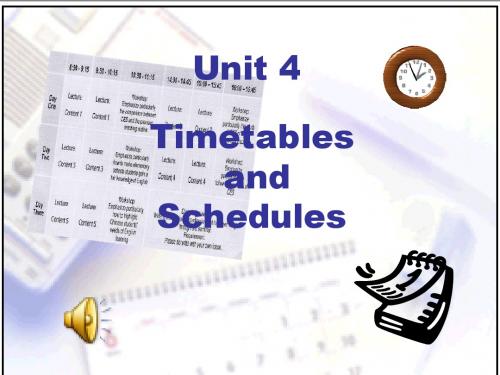
Unit 4
New Practical English I
Useful words and expressions
d. priority: something that is very important and must be dealt with before other things The manager did not seem to consider office safety to be a priority.
Unit 4
New Practical English I
Sentence Writing: Verb Tenses
Main types of verb tenses Future Present Tense: The action will occur at a future time. Future Perfect Tense: The action will have already occurred at a point in the future.
Unit 4
New Practical English I
Reading comprehension
Find out the subordinate clauses in groups.
Read them aloud.
Tell their functions.
Unit 4
New Practical English I
Unit 4
New Practical English I
Applied Writing: Timetable & Schedule
June 8:00 a.m. pick up Mr. Anderson to 22th the airport departure time: Friday 10:10a.m. check in: 9:10 a.m.
《新编实用英语二》Unit4 Talking

5.renovate v. [ ‘renəveit ] 更新,革新,刷新
make brighter and prettier 6.renovation n. [ .renə‘veiʃən ] n. 革新,刷新,修理
the act of improving by renewing and restoring *The hotel will reopen next week after its£1 million
Oh, yes, we do. G: Good. I would like to have a non-smoking room.
h
15
I Would Like to Book a Double Room
R: There are many non-smoking room available in our hotel. May I have your name, please?
h
12
2. Warming up for the new class
When you travel, most often you have to make reservations at a hotel, therefore you must know how to book a hotel room and how to check in or check out at a hotel. They are quite useful and important pieces of information and this unit will tell you how.
back
h
5
Sample 1
Holiday Hotel Guest Services Guide
第五版新编实用英语综合教程第四单元1答案

第五版新编实用英语综合教程第四单元1答案1、I have a _____ every day to keep fit. [单选题] *A. three thousand meter walkB. three-thousands-meters walkC.three-thousand-meters walkD. three-thousand-meter walk(正确答案)2、We ______ boating last weekend.()[单选题] *A. goB. went(正确答案)C. are goingD. will go3、12.That is a good way ________ him ________ English. [单选题] *A.to help;forB.helps;withC.to help;with(正确答案)D.helping;in4、Words are windows()you can look into the past. [单选题] *A. through which(正确答案)B. through thatC. whichD. whose5、My mother’s birthday is coming. I want to buy a new shirt ______ her.()[单选题] *A. atB. for(正确答案)C. toD. with6、38.—Do you have ________else to say for your mistake?—________but sorry. [单选题] *A.anything; SomethingB.something; EverythingC.anything; Nothing(正确答案)D.something; Anything7、Every year Carl _______ most of his time swimming, camping and traveling with his parents. [单选题] *A. is spendingB. spentC. will spendD. spends(正确答案)8、The traffic jams often happen in _______ hours. [单选题] *A. lunchB. workC. leisureD. rush(正确答案)9、People cut down many trees ______ elephants are losing their homes. ()[单选题] *A. ifB. butC. so(正确答案)D. or10、58.—How much is Lucy's skirt?—She________320 yuan for it. I think it's a little dear. [单选题] *A.tookB.paid(正确答案)C.spentD.bought11、You have failed two tests. You’d better start working harder, ____ you won’t pass the course. [单选题] *A. andB. soC. butD. or(正确答案)12、Many people believe that _________one has, _______ one is, but actually it is not true. [单选题] *A. the more money ; the happier(正确答案)B. the more money ; the more happyC. the less money ; the happierD. the less money ; the more happy13、I_____you that I had made the right decision. [单选题] *A.ensuredB.insuredC.assured(正确答案)D.for sure14、The teacher asked him to practice playing the piano _______. [单选题] *A. often as possibleB. as often possibleC. as possible oftenD. as often as possible(正确答案)15、I am worried about my brother. I am not sure _____ he has arrived at the school or not. [单选题] *A. whether(正确答案)B. whatC. whenD. how16、The famous writer, _____ writings for China Daily I appreciate a lot , is invited to give a speech in our university. [单选题] *A. thatB. whose(正确答案)C. whomD. who17、_____you may do, you must do it well. [单选题] *A.WhichB.WheneverC.Whatever(正确答案)D.When18、Mary _______ Math. [单选题] *A. is good at(正确答案)B. do well inC. is good forD. is good with19、His father always _______ by subway. [单选题] *A. go to workB. go to schoolC. goes to bedD. goes to work(正确答案)20、65.There is a big sale on in the shop! Every-thing is ________ price. [单选题] * A.bigB.fullC.zeroD.half(正确答案)21、I run out of money. Could you _______ me some?[单选题] *A. lend(正确答案)B. sellC. borrowD. buy22、You can't see many _____ in a hospital. [单选题] *A. man nurseB. men nurses(正确答案)C. men nurseD. man nurses23、What _______ would you like, sir? [单选题] *A. otherB. else(正确答案)C. othersD. another24、--Henry treats his secretary badly.--Yes. He seems to think that she is the _______ important person in the office. [单选题] *A. littleB. least(正确答案)C. lessD. most25、In many cities, a low-carbon lifestyle has become(). [单选题] *A. more popular and more popularB. more and more popular(正确答案)C. the most popularD. most and most popular26、46.The pants look cool.You can ________. [单选题] *A.try it onB.try on itC.try them on(正确答案)D.try on them27、How beautiful the flowers are! Let’s take some _______. [单选题] *A. photos(正确答案)B. potatoesC. paintingsD. tomatoes28、They returned successfully from ______ moon to _____ earth. [单选题] *A. /; /B. /; theC. the; the(正确答案)D. the; /29、91.—Do you live in front of the big supermarket?—No. I live ________ the supermarket ________ the post office. [单选题] *A.across; fromB.next; toC.between; and(正确答案)D.near; to30、_______ your help, I can’t finish my job. [单选题] *A. withB. without(正确答案)C. inD. into。
新编实用英语综合教程(第四版)上册Unit4-Unit6 课文段落翻译
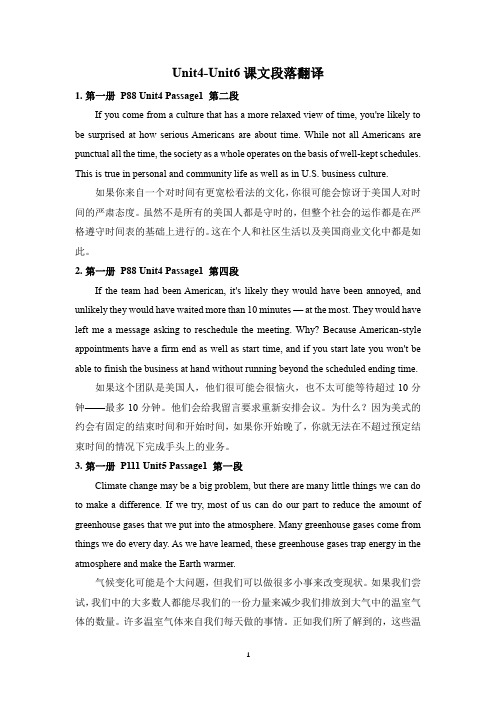
Unit4-Unit6课文段落翻译1.第一册P88 Unit4 Passage1 第二段If you come from a culture that has a more relaxed view of time, you're likely to be surprised at how serious Americans are about time. While not all Americans are punctual all the time, the society as a whole operates on the basis of well-kept schedules. This is true in personal and community life as well as in U.S. business culture.如果你来自一个对时间有更宽松看法的文化,你很可能会惊讶于美国人对时间的严肃态度。
虽然不是所有的美国人都是守时的,但整个社会的运作都是在严格遵守时间表的基础上进行的。
这在个人和社区生活以及美国商业文化中都是如此。
2.第一册P88 Unit4 Passage1 第四段If the team had been American, it's likely they would have been annoyed, and unlikely they would have waited more than 10 minutes — at the most. They would have left me a message asking to reschedule the meeting. Why? Because American-style appointments have a firm end as well as start time, and if you start late you won't be able to finish the business at hand without running beyond the scheduled ending time.如果这个团队是美国人,他们很可能会很恼火,也不太可能等待超过10分钟——最多10分钟。
《新编实用英语》Unit 4 Session 2
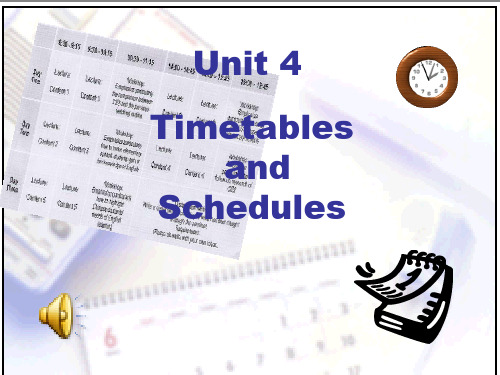
Warm-up questions
2. What do you think of people who are not punctual? Why? I’m coming, darling!
She always keeps me waiting!!!
Unit 4
New Practical English I
Unit 4
New Practical English I
Exercises
Key to Ex. 6: 6. It is hard to imagine what will happen if we don’t pay attention to the environment.
Unit 4
It is hard to imagine what will happen if we don’t take actions to reduce pollution.
Unit 4
New Practical English I
Useful words and expressions
c. what’s the use of: used to tell someone to stop worrying because worrying will not help / it is of no use Try not to get depressed. After all, what's the use of worrying?
Unit 4 Timetables and Schedules
New Practical English I
Session 2 Section III Maintaining a Sharp Eye Passage I
新编实用英语综合教程-第一册-U4-Punctuality-pays

duringv_.sc_安h_e_排du_l_e_d_ office hours. If I am not
there, [ˈʃedju:ld]
_ar_.e预_-s_c定_h_e的d_u_l,_e已_ 排an日oth程er的appointment.
2. _______ a convenient time, at least re-schedule [riˈʃeodnjucSce:lhdae]dwuvle.e重ek新, to定c排all and talk with
What is the your teachers’ attitude to time?
• One of the biggest problems that tendasnntooy _______(惹恼) your
theaaschteorsdo
_w_it_h_________p(u与nct…ua相l 关) your being late for class because not all
• Arriving at my offic3e0 _m_i_n_ut_e_s__a_f_te_r__t_h_e_a_p_p_o_i_n_tm_e_n_t___ (when) I found a voice messagheursroieId _i_n_______(what) being afraid that I had missed the appointment.
1.What is the Americans attitude to time?
2.What is the real-life story happened to the author?
3.What are the tips for behavior about appointment and punctuality?
- 1、下载文档前请自行甄别文档内容的完整性,平台不提供额外的编辑、内容补充、找答案等附加服务。
- 2、"仅部分预览"的文档,不可在线预览部分如存在完整性等问题,可反馈申请退款(可完整预览的文档不适用该条件!)。
- 3、如文档侵犯您的权益,请联系客服反馈,我们会尽快为您处理(人工客服工作时间:9:00-18:30)。
Unit | Four
Section Ⅰ Talking Face to Face 面谈
Imitating Mini-Talks
Speak and Recite
Acting Out the Tasks
Imitate and Perform
Putting Language to Use Speak and Complete
Unit | Four
What Do You Do Every Day?
Unit | Four
What You Should Learn to Do 学会做什么
1. Talk about daily activities 谈论日常活动
2. Tell time and date 告知时间和日期
What You Should Know About 学会了解什么
1. How people arrange their time 人们如何安排时间
2. Present tense 一般现在时
Unit | Four
Talking Face to Face 面谈
Section Ⅰ
Contents
Section Ⅱ
Being All Ears 洗耳恭听
Section Ⅲ
Unit | Four
Putting Language to Use 使用语言
Speak and Complete 学说填空 3. Complete the following dialogue according to the hints given in Chinese.
根据中文提示填入恰当语句补全下列对话。
Read and Judge 阅读判断
Read and Correct 阅读改错
F
→ Do
F
→ He does not jog
T
→ feels happy
T
→ Does she give
T
→ Why do American people
Back
Unit | Four
What day is today
I often go to the park Do you often cook by yourself
What time is it now by your watch
Back
Unit | Four
SECTION II Being All Ears 洗耳恭听
Listen and Remember
Back
Unit | Four
Listen and Translate 听录音译语句
3. Listen to 10 communicative sentences and then translate them into Chinese or English orally. 听10个交际语句的录音并将其口译成汉语或英语。
No, he sometimes works with other teachers in his office.
office
shows
He learns Chinese from his students.
feels
He feels very happy.
Back
Unit | Four
Back
Unit | Four
Unit | Four
Imitating Mini-Talks 模仿小对话
Speak and Recite 学说背诵 1. Work in pairs and practice the following mini-talks. 分组练习小对话。
Unit | Four
Back
Unit | Four
Back
Unit | Four
SECTION III Enjoying Reading 轻松阅读
Understanding Passages
Read and Answer
Read and Complete
Read and Unit | Four
Understanding Passages 文章理解
Chinese translations. 听录音并记住10个英语交际语句及其汉语译文。
Back
Unit | Four
Listen and Respond 听录音选答语 2. Listen to 4 incomplete short dialogues and choose the right responses. 听4个不完整的小对话并选取恰当的答语。
A
D B
B
Script: 1) What time is it now by your watch? 2) What is the date today? 3) Do you also work on Sundays? 4) Does Mrs. Green often cook Chinese food?
Back
Unit | Four
Read and Answer 阅读回答
Read and Complete 阅读填空
He gets up at 6:00 in the morning.
campus
basketball
No. He does other things in the afternoon.
Acting Out the Tasks 演练任务
Imitate and Perform 模仿表演 2. Work in pairs and act out the tasks by following the above sample dialogues.
根据上面的对话样例分组演练交际任务。
Back
1) 我春节时总要回家。 2) 汤姆在那个学院教英语。 3) 南希喜欢在乡村度周末。 4) 怀特小姐9点准时喝杯茶。 5) 我父亲6点半听广播。 6) I watch TV news every evening. 7) Mr. Green goes to work at 10 by train. 8) I don’t like pop music. 9) I get up at six in the morning. 10) Is the Spring Festival in February this year?
Picking Up Communicative Listen and Respond Sentences
Listen and Translate
Unit | Four
Picking Up Communicative Sentences 学习交际语句
Listen and Remember 听录音记语句 1. Listen and try to remember 10 English communicative sentences with their
Unit | Four
Script: 1) I always go home on the Spring Festival.
2) Tom teaches English in that college. 3) Nancy enjoys her weekends in the country. 4) Miss White has a cup of tea at nine sharp. 5) My father listens to the radio at half past six. 6) 我每天晚上看电视新闻。 7) 格林先生10点钟乘火车上班。 8) 我不喜欢流行音乐。 9) 我早上6点起床。 10) 今年的春节是在二月吗?
